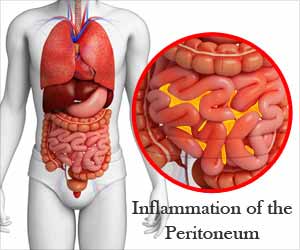- Home
- Editorial
- News
- Practice Guidelines
- Anesthesiology Guidelines
- Cancer Guidelines
- Cardiac Sciences Guidelines
- Critical Care Guidelines
- Dentistry Guidelines
- Dermatology Guidelines
- Diabetes and Endo Guidelines
- Diagnostics Guidelines
- ENT Guidelines
- Featured Practice Guidelines
- Gastroenterology Guidelines
- Geriatrics Guidelines
- Medicine Guidelines
- Nephrology Guidelines
- Neurosciences Guidelines
- Obs and Gynae Guidelines
- Ophthalmology Guidelines
- Orthopaedics Guidelines
- Paediatrics Guidelines
- Psychiatry Guidelines
- Pulmonology Guidelines
- Radiology Guidelines
- Surgery Guidelines
- Urology Guidelines
AIIMS releases guidance on Antibiotics in Peritonitis

All India Institute of Medical Sciences, Delhi has released AIIMS Antibiotics Policy which has been prepared by the Department of Medicine with Multidisciplinary collaboration. The guidance for Gastroenterological Infections includes Peritonitis the salient features of which have been authored in the guidance.
Peritonitis is defined as inflammation of the peritoneal surface that is caused by perforation of abdominal organs (Secondary) or without any obvious surgically treatable cause (Primary)
Spontaneous Bacterial Peritonitis (SBP) is defined as ascitic fluid and peritoneal infection without an evident intra-abdominal surgically treatable source. SBP should be suspected in patients with advanced cirrhosis and ascites who develop fever, abdominal pain/tenderness, altered mental status and decreased urine output. Diagnosis of SBP is confirmed by positive ascitic fluid culture and elevated ascitic fluid polymorphs > 250/mm3. Ascitic fluid should be sent for bacterial and fungal cultures.
Secondary Peritonitis / GI Perforation should be suspected in all patients with acute abdomen and the diagnosis is confirmed by demonstrating extra-luminal free air or contrast leak on radiological imaging. The ascitic fluid analysis will mostly show poly-microbial infection with elevated protein (>1g/dL) and LDH (>225U/L) and low glucose (<50mg/dL). Ascitic fluid should be sent for bacterial and fungal cultures.
1) Spontaneous bacterial peritonitis (No risk factors for MDR)
Aetiology:
Gram-negative bacilli (E.coli > Klebsiella) more common than Gram-positive organisms (Staphylococcus spp., Streptoc
Treatment:
Inj. Cefotaxime 2gm TDS for at least 5 days (48 hours after signs and symptoms have disappeared)- if fever persists after 5 days- PMN<250- treatment may be stopped but if PMN>250- repeat paracentesis after 48 hrs
2) Spontaneous bacterial peritonitis [With risk factors for MDR (Nosocomial acquired infection, frequent healthcare contacts, H/O previous episode with resistant species)]
Aetiology:
MDR – Enterobacteriaceae, Methicillin-resistant Staphylococcus aureus
Treatment:
Piperacillin+ Tazobactam 4.5g IV q 8 hrs
Or
Cefoperazone+ Sulbactam 2-3 gm IV q12 hrs
Or
Imipenem+ cilastatin 500mg IV q 6 hrs
Or
Meropenem 1-2g IV q8 hrs
Special Remarks:
-Beta-blockers are associated with poor outcomes and therefore, should be discontinued.
-Avoid urinary catheterization and use of PPI.
-In case of resistance, fluoroquinolones can be used if susceptible.
Prophylaxis:
-History of SBP: Long term Cotrimoxazole DS- 1 tablet OD or Tablet Ciprofloxacin 500 mg OD
-Hospitalization for any other reasons: (Ascitic fluid protein <1g/dl) Cotrimoxazole DS- 1 tablet OD or Tablet Ciprofloxacin 500 mg OD till the time the patient is hospitalized
-An episode of GI bleed- 7 days of antibiotics after the episode
a) Child-Pugh A-Cotrimoxazole DS-1 tab BD or Tablet Ciprofloxacin 500 mg BD
b) Child-Pugh B/C- Injection Ceftriaxone 1g OD until the patient can take orally
3) Secondary bacterial peritonitis:
Aetiology:
Polymicrobial from gut origin – Gram-Negative Bacteria, Anaerobes and Gram-positive aerobes
GNB – E.coli, Klebsiella, Enterobacter, Proteus
Anaerobes – Bacteroides
GPB – Streptococcus, Enterococcus
Treatment:
Piperacillin+ Tazobactam 4.5g IV q 8 hrs
Or
Cefoperazone+ Sulbactam 2 gm IV q12 hrs
Or
Imipenem+ Cilastatin 500mg IV q 6 hrs
Or
Meropenem 1-2g IV q8 hrs
Antifungal therapy (Inj. Caspofungin 70mg f/b 50mg OD) can be added in selective cases
Special Remarks:
Routine empirical antifungal therapy is not recommended unless following risk factors are present - Esophageal perforation, Immunosuppression, Prolonged antacid therapy, Prolonged antibiotic therapy/hospitalisation, Persistent GI leak.

Disclaimer: This site is primarily intended for healthcare professionals. Any content/information on this website does not replace the advice of medical and/or health professionals and should not be construed as medical/diagnostic advice/endorsement or prescription. Use of this site is subject to our terms of use, privacy policy, advertisement policy. © 2020 Minerva Medical Treatment Pvt Ltd